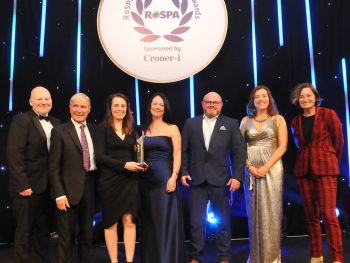Q&A: Cavendish Nuclear on its RoSPA Fleet Safety Award win success
Cavendish Nuclear won the coveted fleet safety trophy at this year’s RoSPA Health and Safety Awards – the latest in the company’s long line of RoSPA accolades.
Paul Unsworth, SHEQR director, shares insights on the awards win success and Cavendish Nuclear’s unwavering commitment to managing road risk.

Paul Unsworth (far left), SHEQR director at Cavendish Nuclear, next to RoSPA life president Lord Jordan
How did Cavendish Nuclear clinch its award and what are the main strengths of its road risk management programme?
We believe there are several factors that underpin our success in the Fleet Safety Award and the story starts back in 2012 when we first launched our Occupational Road Risk programme.
Cavendish Nuclear has the health and safety of our people as a fundamental core value and we have built a solid, mature health and safety culture over the last decade.
We’re a nuclear company and therefore it would be completely natural to assume that our biggest risk would involve some of our high-hazard activities at our sites and our customer sites. However, by far the biggest risk to our people is getting to those sites and this inevitably involves driving.
We recognised this back in 2012 and that is when we first launched our Road Risk programme. The starting point was to ensure we has clear and visible leadership from the very top of the organisation. Raising awareness across our colleagues was a priority and, teaming with Drive Smarter, we deployed their online modules, with each module tailored to include a short introduction video to explain the module and why it was important in managing road risk.
We also supported this with on-road training and a dedicated page on our Sharepoint system, focusing on managing occupational road risk and providing simple tools and guidance on topics such as vehicle checks and journey planning.
We also introduced our annual Driver and Journey Risk Assessment Process and this was pivotal in driving a culture change across the organisation as it provided a vehicle for individuals to discuss travel with their line manager, to assess the likely journeys to be undertaken and to agree a travel strategy for each – e.g. challenge the need to travel in the first place, public transport rather than driving if travel is required, overnight stays if driving is required, etc.
We found this particularly enabling as it transmitted a clear signal to our people that we take this seriously. It also provides a vehicle for the company to collect info on personal risk factors (annual mileage, points, etc) to determine that individual’s risk and to identify any additional training needs.
Our commitment to managing road risk has been unwavering since then and this has been recognised by RoSPA each year with Gold Awards and with our first President’s Award last year and I think this is an important factor in why we were successful this year.
Where has the company made particular improvements?
We have made many improvements over the last decade. Our incident rate has dropped, but the amount of reporting has increased. This might seem contradictory, but over the last 10 years we have seen a steady decrease in RTCs (and a corresponding decrease in ‘own-fault’ incidents as well), but we have seen a marked increase in the number of reports submitted by our employees in relation to vehicle defects that have been identified in pre-use vehicle checks and also reports of unsafe driving behaviour of others so that we can learn and share those.
In addition, we have a range of other metrics relating to travel and we have seen a decrease in car miles and an increase in public transport miles (apart from the Covid years, of course).
What wider benefits has Cavendish Nuclear seen from robust road risk management?
Ultimately, it is about safety of our people, but we have seen a number of other benefits too. We have seen a reduction in car miles and an increase in rail miles over the last five years. There has therefore been an overall reduction in our carbon footprint arising from travel, which is a huge positive and keeps us on track as part of our wider PlanZero40 programme to be carbon-neutral by 2040 across the whole of the Babcock Group.
What’s next for your programme?
Our approach developed over 10 years within Cavendish Nuclear has been shared with the Babcock Occupational Road Risk Group and is being adopted company-wide where possible. As a group, we are in the process of identifying further improvements that we can implement across the global business.
Within Cavendish Nuclear, we continue to operate our existing programme and have set some new challenging metrics for the next five years. We are in discussion with a provider for a car-sharing scheme to make it easy for our people to car share on company business and also commuting mileage and we are just about to launch our brand-new travel page that makes it easier for our people to consider public transport choices to our sites as part of the annual Driver and Journey Risk Assessment process. We’ve also set some ambitious targets in relation to transitioning to EV-only company cars and site vans by the end of the decade.
What advice do you have for other fleet operators looking to go above and beyond on fleet safety excellence?
I think it comes down to a number of things:
Leadership – clear leadership from the top that doesn’t mix messages on safety vs budget when it comes to road risk. Any conflicting messaging can seriously damage your culture.
Tools – provide your people with tools that help them make informed decisions and ensure the Line Manager is integral to that process.
Trust – trust your people to do the right thing, make the expectations clear, give your people the tools to make the informed decisions and trust them to do the right thing.

